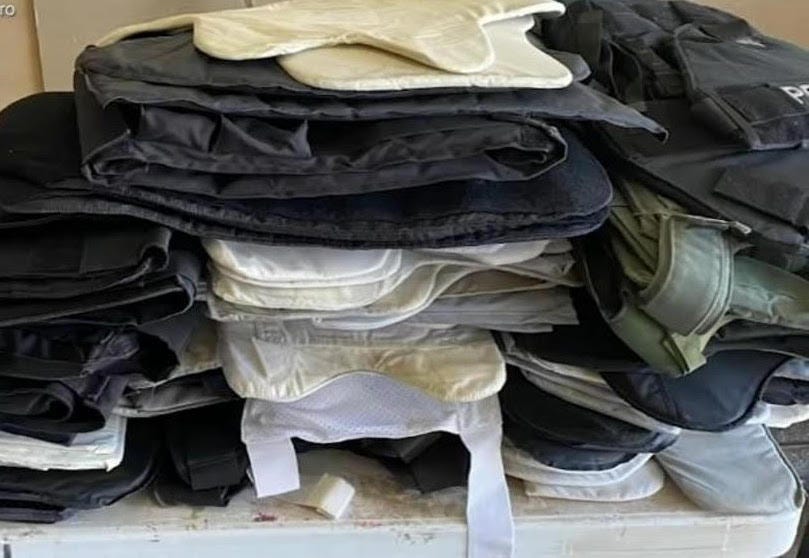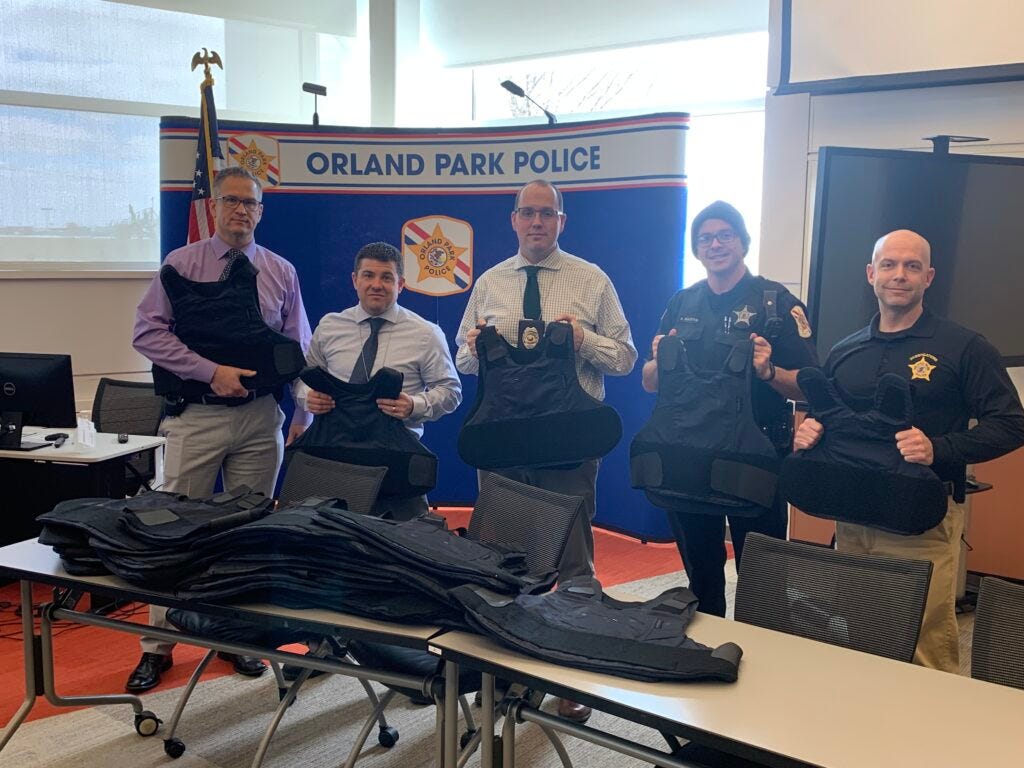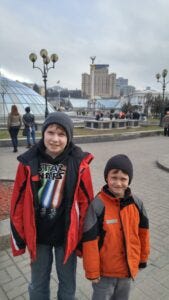Aiding in the fight from 5,300 miles away
Former Mokena police chief, sister sending donated bulletproof vests, other protective gear to Ukrainians battling Russian invasion

She found out about his death on Facebook.
Just two days into the Russian invasion of Ukraine, Jennifer Doloski woke up to a Facebook message from a coworker letting her know that their boss, Serge Zevlever, was dead.
“That’s all it said – ‘Serge is gone,’” Doloski recalled.
It took Doloski a little while to find out the details of how Zevlever, 62, the founder of Hand of Help in Adoption was killed on Feb. 26. But eventually, she saw an account of what happened.
“[Zevlever and his wife] had stayed in [Kyiv] and had taken shelter with some of their neighbors and perhaps some of the government officials that Serge was accustomed to working with, and there was a commotion outside of the shelter,” Doloski said. “He stepped outside to see what it was, and at that point he was shot by a Chechen sniper.”
According to a St. Louis Post-Dispatch story on Zevlever’s death, his daughters told the reporter that he was shot in the chest.
“He was not in a scuffle, he was not on the front lines,” his daughter, Alisa Sander, told the Post-Dispatch. “He went outside to see if it was safe for everyone else, but they were aiming their guns right at the place where these people were sheltering.”
The aftermath of Zevlever’s death, however, has led to Doloski and her brother, retired Mokena Chief of Police Steven Vaccaro, to collect protective gear for the people of Ukraine – including bulletproof vests and ballistic helmets.
Connection to Ukraine

Doloski’s connection to Ukraine is much more personal than a job, and it predates her position as a stateside coordinator at Hand of Help in Adoption.
She and her husband have adopted three children from Ukraine: Joshua in 2012; and Caleb and David in 2016.
“Ukrainian adoptions are considered to be independent adoptions, meaning you don’t go to an all-in-one agency like if you were adopting from China,” she said. “Ukrainian adoptions, you do much of the work yourself. You find your own social worker. You are responsible for the preparation of all your paperwork, and you have a team in Ukraine that you work with.”
That is how she first got involved with Hand of Help in Adoption, as the organization assisted during her adoptions.
In 2018, the organization asked her to take her involvement to the next level – by serving as one of two U.S.-based coordinators. The rest of the team is based in Ukraine.
She did not hesitate.
“They were and they are a wonderful team,” she said.
‘It was heartbreaking. It was scary.’
The days leading up to Feb. 24 were filled with reporting that Russian President Vladimir Putin was planning to invade Ukraine. But, according to Doloski, few people she knew in Ukraine actually believed it would happen.
“Because Putin has puffed up his chest so many times,” she said. “There was 2014 when he pushed into some of the eastern regions, but since then, it has been relatively quiet.
“I don’t want to say [people] were caught by surprise, but they were shocked.”
Doloski watched with the rest of the world as television reports and social media showed the early bombings and movement of Russian troops into cities like Kyiv.
“It was heartbreaking,” she said. “It was scary. We actually had one family left in the country that was just completing their adoption. They were supposed to fly out the morning the bombs started falling. They actually had to be driven to Romania to catch a flight to Warsaw.”
Doloski said two members of the Hand of Help in Adoption team drove the couple to Romania before turning back around to head home for their families and to defend their country.
Then, two days later, Zevlever – who also founded an organization that works with older children who have lost their parents and may have mild special needs – was killed.
Soon after, Doloski said two of the men who worked as facilitators for the adoption agency, Alex and Yuri, went to fight for their country. One of them messaged a U.S. family that had used the adoption service and asked for help in obtaining bulletproof vests and protective gear.
When Doloski found out, an idea formed. Her brother, Vaccaro, was a retired police chief with a wide professional network.
Support from law enforcement

Vaccaro had a long career in law enforcement, serving the Tinley Park Police Department for 24 years before becoming the chief of police in nearby Mokena for nearly seven years.
He knows the importance of being protected while out on patrol and the crucial role that bulletproof vests play in officers’ safety.
“This protective equipment for somebody active in law enforcement means life or death,” Vaccaro said. “Without the benefit of a protective vest, an officer would be exposed in the event that he or she encountered a deadly force situation.”
When his sister told him about what happened to Zevlever, Vaccaro immediately empathized with the situation.
“He was unprotected,” Vaccaro said. “He just grabbed a rifle and went out to fight for his freedom, and he was killed.”
Vaccaro wanted to help, and so he started making calls. One of those was to the Illinois Association of Chiefs of Police and its executive director, Ed Wojcicki.
“I was moved by the personal story of Steve’s sister adopting the three boys from Ukraine and then experiencing the death of the adoption agency contact in the Ukraine war,” Wojcicki said. “How tragic. That propelled her to want to help, and when the request came from her brother, the retired chief, it was an easy decision to reach out to law enforcement and ask them to help, too.”
Wojcicki sent out a message to the association’s vast membership. It didn’t take long for the ball to start rolling.
“It just blew up,” Doloski said.
Donations of vests and other protective gear started pouring in from all over the state.
“The response has been unbelievable,” Vaccaro said. “We are just shy of 300 vests [on March 15], and they are either shipped or committed [to the cause]. I’ve got 90 ballistic helmets coming. An agency in Rockford just sent out a bunch of vests and SWAT tourniquets and high-quality eye protection. We are doing a lot in getting this equipment to Ukraine.”
The response was not a surprise, however, to Wojcicki.
“This is what people in law enforcement do for each other, and it’s wonderful to observe,” he said. “The fact that this request came from a retired chief made it natural for officers elsewhere in Illinois to say instinctively, ‘I want to help.’ Plus, we are bonded at a higher level by our concern for the people in Ukraine.”
Orland Park Chief of Police Joseph Mitchell shares in those feelings.
“Ukraine has been a very good ally of the U.S. through the years,” he said. “We have been watching the news and seeing what has been going on. It’s very tragic, and it is close to my heart, because I have family out there.”
Mitchell’s department helped the cause by donating 12 surplus vests.
“These were vests that [were around] after an officer retired or an officer had quit or maybe got a full-time job somewhere else,” he said. “These were surplus vests that had not expired and were available. We were not going to destroy them, so they would be better served over in Ukraine.”
The power of networking
As the donations came in, a new problem presented itself to Doloski and Vaccaro: How were they going to get this equipment to Ukraine?
Doloski has a personal FedEx account, and in the early going, they were sending some of the materials to Warsaw, Poland to be delivered across the border to Ukrainians. But each shipment of even just one vest in one box would cost anywhere from $300 to $400.
Vaccaro took to the internet, and what he found was an article in Patch about a company in Frankfort, F45 Fitness, that was sending out aid to Ukraine.
He reached out to Yana Tymoshenko, of F45, asking if there was any way they could partner and share in the shipping costs.
“It turns out her husband is in the global transport industry, and they are shipping almost weekly a ton of stuff,” Vaccaro said. “The organization that they created is Help Heroes of Ukraine. They are doing great things, and they are taking anything that we send them and are shipping it.”
Doloski also shored up another avenue of getting the equipment to Ukraine.
When she adopted her children, her family partnered with Reece’s Rainbow – a charity that allows families to fundraise for their adoptions. When her Ukraine efforts began, she reached out to the organization and asked if they could provide a link and account to use if people wanted to donate to the cause.
“So, if people want to contribute to the shipping of these vests, because now that is becoming a pretty big expense, they can do that,” Doloski said.
The online fundraiser can be found at https://reecesrainbow.org/158418/jennifers-fundraiser.
What started as a simple request from two freedom fighters in Ukraine has now turned into something much larger – a fact that Vaccaro is quick to point out.
“This isn’t about me or my sister – it is about the people in Ukraine,” he said. “But it is also about networking. Without networking, where would we be? It is about everybody involved coming together and making this a huge effort. If it was just me or my sister, we might have five or 10 vests and a very expensive FedEx bill.”
Answering the call
The world is a very different place than it was in the 1940s. Moreover, technology has exponentially grown since even the early 2000s.
That advancement shows in how the invasion of Ukraine has been covered by media and social media.
“It is a humanitarian crisis, and I think because we are in the era of the 24/7 news cycle, we are seeing this as it is happening,” Doloski said. “This isn’t World War II, where people saw what was happening on Sundays at the movies on a news reel. We are seeing what is happening either as it is happening or minutes after.”
That real-time access to seeing and hearing what is going on has led to an outpouring of support and aid to Ukraine.
“People felt helpless, and they wanted to do something,” Doloski said. “But a lot of people didn’t know what to do. When they find out how they can help, they are more than glad to. Really, what we’ve done isn’t anything amazing. We’ve just given a lot of people the channel to contribute.”
Vaccaro added that he hopes the equipment being sent overseas to the Ukrainians will offer protection to “the Ukraine military, the first responders and the unprotected civilians who are actively engaging the enemy to maintain their freedom.”
As Ukrainians take up arms to defend their country’s independence, Doloski said the fighting spirit captured on social media may be a surprise to some – but not to her.
“When all of this started, in the first three or four days after the war started, people were just expressing their amazement at the attitude of these Ukrainians and the bravery and patriotism,” she said. “It seemed like such a surprise for so many people. But to any of us who have friends in Ukraine or any of us who have spent time in Ukraine, it wasn’t a surprise at all.
“That really is who they are and how they are. They are a very young country, and they are very proud of that country.”




